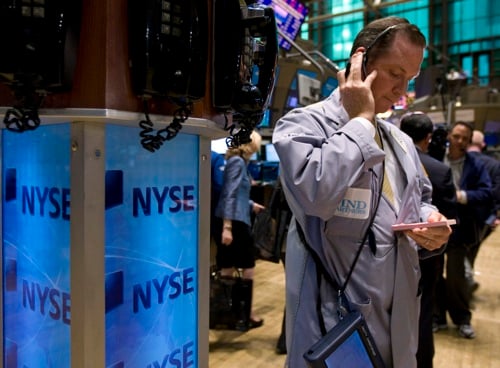<i>Investors are getting nervous.</i> Hiring data is not good. Europe's a problem again. Portfolio managers are predicting a sizable drop in the market -- a downturn that may have officially commenced with Wednesday's sell-off of large caps. But Blackstone's Byron Wien doesn't seem chuffed. In fact, he says the next few months should present a tremendous opportunity for astute stock pickers.
The biggest retreat in the Standard & Poor's 500 Index since August is creating a buying opportunity for investors willing to withstand declines that may reach 10 percent, according to Blackstone Group LP's Byron Wien.
The benchmark gauge of U.S. stocks tumbled 2.3 percent to 1,314.55 yesterday after manufacturing expanded at the slowest pace in more than a year and employers hired fewer workers than forecast. The decrease was the 126th decline of 2 percent or more during bull markets since 1962, according to Kevin Pleines, an analyst at Birinyi Associates Inc. in Westport, Connecticut. Of those, 30 percent occurred within a month of the start of a so-called correction, or 10 percent drop, he said.
More than $578 billion has been erased from American equity markets since the S&P 500 peaked at 1,363.61 on April 29, pushing the index's valuation to 13.3 times estimated profit for 2011 from 13.8 times. Wien, who estimates earnings for companies in the gauge will climb about 12 percent in 2011, says shares will prove a bargain and the index will rally.
“Investors should be looking for buying opportunities,” said Wien, the vice chairman of Blackstone Advisory Partners, whose parent, New York-based Blackstone Group LP, is the world's largest private-equity firm. “The economy is not as bad as it looks right now. Corporate profits will be good, very good. People are asking me, ‘Do you still think the market can get to 1,500 by the end of the year?' I do.”
Called Bottom
Wien, who called the stock-market bottom in March 2009 before the S&P 500 doubled, is more optimistic than the 13 Wall Street strategists surveyed by Bloomberg. His year-end prediction of 1,500 for the S&P 500 is 6 percent higher than the median forecast of 1,415.
The 78-year-old strategist said in a telephone interview that he's bullish after the S&P 500 fell 3.6 percent between April 29, when it rallied to the highest level since 2008, and yesterday. Equities slumped as reports showed business activity cooled more than forecast, sales of existing homes unexpectedly declined and growth in industrial production stopped.
Stocks also fell amid concern Europe's debt crisis is worsening and crude oil near $100 a barrel will reduce consumer spending. S&P and Moody's Investors Service cut Greece's credit rating in the past month, and European officials are negotiating the country's second bailout in two years.
Laszlo Birinyi, the founder and president of Birinyi Associates and an equity trader for Salomon Brothers Inc. in the 1980s, said last week the S&P 500 “well might” fall into a correction of 10 percent or more. In a May 25 research note, he advised clients against reacting to fluctuations in shares.
‘Squiggle or Turn'
“It is our contention that our clients are investors, not traders, and do not have the time, inclination or desire to respond to every squiggle or turn of the stock market,” he wrote. “Our view is that the bull market is intact and our goal remains to make you 10 percent to 15 percent for the year.”
The S&P 500 rallied 30 percent between Aug. 27, when Federal Reserve Chairman Ben S. Bernanke signaled he might begin a second round of asset purchases to stimulate the economy, and April 29. Wien said yesterday that he was surprised by the rally because it coincided with greater investor optimism.
“There was a general positive mood,” he said. “That doesn't mean that the market can't go up, and it did, but it does mean that you've got to keep your eye out for a correction.”
Wien favors companies most-tied to economic growth, including energy, industrial and technology companies. Those S&P 500 groups have fallen 6.8 percent, 6.1 percent and 4 percent, respectively, since the end of April.
‘Beaten Up'
“Some sectors already got beaten up mercilessly,” Wien said. “That's where the opportunities are going to be.”
Investors withdrew $3.16 billion last week from mutual funds that buy U.S. stocks, the highest amount in more than seven months, according to data compiled by the Washington-based Investment Company Institute. A net $18.5 billion was added during the first four months of the year, ICI data show.
“The market does best when investors' sentiment is negative and it's converted to positive,” Wien said. “During the next few weeks or months, the optimism at the beginning of the year will be converted to pessimism, the fundamentals of the economy will improve and that combination will make for a better fourth quarter.”







